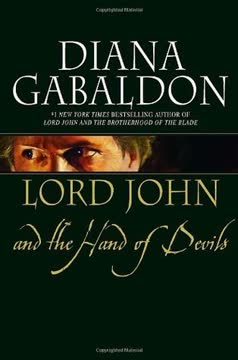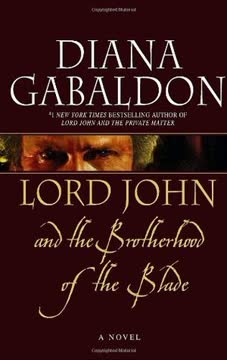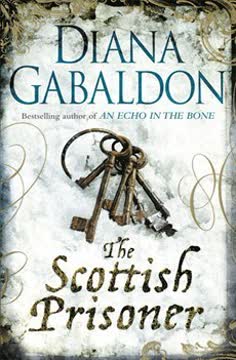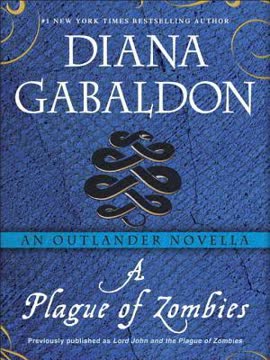Plot Summary
Shadows in the Club
Lord John Grey, recently back from Scotland, finds himself at the Society for Appreciation of the English Beefsteak, a gentleman's club in 1756 London. Haunted by memories of Jamie Fraser and his own forbidden desires, he is drawn to a red-haired stranger, Robert Gerald, whose presence stirs old longings and new intrigue. Amidst the club's masculine camaraderie, Lord John's attention is divided between the mundane—gossip, politics, and marriage prospects—and the electric undercurrent of secrets and unspoken passions. The chapter sets the tone of tension between public duty and private longing, as Lord John is pulled into a web of political and personal intrigue that will soon turn deadly.
A Red-Haired Death
Lord John's fleeting connection with Robert Gerald is violently severed when Gerald is stabbed in a crowded London street. The murder is public, brutal, and leaves Lord John with a dying man's desperate plea for help. The shock of the event is compounded by the realization that Gerald's death is no random act but a calculated assassination, possibly tied to political machinations or personal secrets. Lord John's grief is raw, mingled with guilt and a sense of responsibility. The emotional impact is heightened by the knowledge that Gerald's last word—"Dashwood"—may be the key to unraveling the mystery, setting Lord John on a path of vengeance and discovery.
Scandal and Slander
In the aftermath of Gerald's murder, London is awash with scandalous broadsheets accusing the dead man of sexual deviance and secret society membership. Lord John, together with Harry Quarry and Lady Lucinda Joffrey, investigates the origins of these rumors, suspecting an organized campaign to destroy Gerald's reputation posthumously. The social and political stakes are high, as the slander threatens not only Gerald's memory but also the standing of his influential relatives. Lord John's own position is precarious, as he navigates the dangerous intersection of public morality, private desire, and the shadowy world of the Hellfire Club.
The Hellfire Invitation
Lord John's inquiries lead him to the notorious Hellfire Club, presided over by Sir Francis Dashwood. Invited to Medmenham Abbey under the guise of political camaraderie, Lord John is acutely aware that he is being tested—for loyalty, for secrets, for suitability. The club's reputation for blasphemy, debauchery, and political intrigue is both a lure and a threat. As Lord John moves among powerful men, including his former lover George Everett, he senses that the answers to Gerald's murder and the slander campaign lie within this circle. The tension between desire and danger grows, as Lord John prepares to risk everything for the truth.
Baptized in Blood
At the heart of the Hellfire Club's rituals, Lord John is subjected to a mock "baptism" in blood and a nightmarish initiation involving drugs, a dead woman, and a staged scene meant to implicate him in murder. The true killer is revealed to be George Everett, whose ambition and fear of exposure led him to murder Gerald and orchestrate the slander. In a violent confrontation, Lord John narrowly escapes death, aided by Harry Quarry. The emotional climax is one of betrayal, loss, and the bitter knowledge that justice is often personal and incomplete. Lord John emerges scarred but resolute, his sense of honor intact.
The Succubus Stirs
Now serving as a liaison officer in Hanoverian Germany during the Seven Years' War, Lord John is drawn into a new mystery: soldiers are dying under mysterious circumstances, and rumors of a succubus—a female demon—spread panic through the ranks. The rational Englishman is skeptical, but the deaths are real, and the superstitions of the local populace and soldiers alike threaten to undermine morale. Lord John's investigation is complicated by language barriers, cultural differences, and his own growing attraction to the Hanoverian officer, Stephan von Namtzen.
Nightmares in Gundwitz
As the deaths continue, Lord John finds himself navigating not only the supernatural fears of the soldiers but also the complex social dynamics of the German aristocracy. The castle of Princess von Lowenstein becomes a microcosm of suspicion, secrets, and sexual tension. Lord John's relationship with Stephan deepens, but is shadowed by uncertainty and the ever-present threat of exposure. The line between rational inquiry and irrational fear blurs, as dreams, hallucinations, and emotional flashbacks press in on all sides.
Secrets of the Graveyard
The investigation leads to midnight exhumations, gypsy curses, and the revelation that the supposed supernatural deaths are the result of human malice and political manipulation. The "succubus" is a cover for espionage and psychological warfare, designed to weaken the allied forces before a French attack. Lord John's persistence uncovers the real killers and exposes the web of lies, but not without personal cost. The chapter is suffused with the chill of the grave, the weight of history, and the bittersweet triumph of reason over superstition.
The Witch's Bargain
In a final confrontation with the gypsy woman at the heart of the rumors, Lord John negotiates a fragile peace. He secures the exoneration of an innocent woman and ensures that the true story will be told, even as he recognizes the limits of justice in a world ruled by fear and prejudice. The emotional resolution is one of weary compassion, as Lord John acknowledges the complexity of human motives and the necessity of compromise. The war continues, but a measure of order is restored.
The Haunted Arsenal
Back in England, Lord John is summoned to the Woolwich Arsenal to answer for a disastrous cannon explosion during the battle of Crefeld. The inquiry is fraught with political intrigue, personal animosity, and the specter of sabotage. Lord John is haunted—literally and figuratively—by the ghosts of the dead, the weight of command, and the possibility that he is being set up as a scapegoat. The chapter is a meditation on guilt, responsibility, and the corrosive effects of institutional corruption.
Inquisition and Accusation
The official inquiry becomes an inquisition, as Lord John is grilled about his actions, his family connections, and his possible culpability in the explosion. The political stakes are high, with rival factions seeking to use the disaster for their own ends. Lord John's integrity is tested to the breaking point, as he confronts the possibility that he may have made a fatal error—or that he is the victim of a larger conspiracy. The emotional arc is one of isolation, self-doubt, and the search for redemption.
Powder, Politics, and Betrayal
Determined to clear his name, Lord John investigates the supply chain of gunpowder, uncovering a network of corruption, theft, and political manipulation that reaches into the highest levels of government. Allies and enemies are not always easy to distinguish, and the cost of truth is high. The resolution is both satisfying and sobering: the real culprits are exposed, but the machinery of power grinds on, indifferent to individual suffering. Lord John's sense of justice is tempered by the realities of war and politics.
The Hero's Return
Vindicated but changed, Lord John returns to London, where he is celebrated as a hero but remains haunted by the ghosts of the past and the compromises of the present. Personal relationships—family, friends, lovers—are tested and redefined. Letters are written and burned, confessions made and withheld. The final note is one of bittersweet acceptance: honor is not the absence of failure or pain, but the courage to persist in the face of both.
Masks and Revelations
At a masquerade in Vauxhall Gardens, Lord John confronts the tangled web of political and personal intrigue that has ensnared him. Deals are struck, secrets exchanged, and the boundaries between public and private selves are blurred. The emotional climax is one of revelation and release, as Lord John comes to terms with his own desires, fears, and the cost of survival in a world that demands masks of all its players.
Letters Never Sent
In the quiet aftermath, Lord John writes letters he will never send, confiding in the absent Jamie Fraser and seeking solace in the act of confession. The narrative closes on a note of introspection and unresolved longing, as Lord John acknowledges the enduring power of love, the necessity of secrecy, and the hope that, in some future, understanding and acceptance may be possible.
Characters
Lord John Grey
Lord John Grey is a British officer, a younger son of nobility, and a man living with the secret of his homosexuality in a perilous era. His life is a constant balancing act between public duty and private longing, between the demands of honor and the realities of desire. Intelligent, sensitive, and deeply ethical, Lord John is both investigator and outsider, drawn into mysteries that test his courage, his loyalty, and his heart. His relationships—with family, friends, lovers, and adversaries—are marked by complexity and ambiguity. Over the course of the stories, he grows from a man haunted by the past into one who accepts the burdens and gifts of his nature, even as he recognizes the limits of justice and the cost of survival.
Harry Quarry
Harry Quarry is Lord John's friend, fellow officer, and occasional confidant. A man of action rather than introspection, Quarry provides both comic relief and steadfast support. His straightforwardness contrasts with Lord John's subtlety, but his loyalty is unwavering. Quarry's own scars—literal and figurative—speak to a life lived on the edge of violence and honor. He is both a reminder of the camaraderie of the regiment and a touchstone for Lord John's sense of belonging.
Robert Gerald
Robert Gerald is the red-haired young man whose murder sets the first novella in motion. His brief but intense connection with Lord John is charged with unspoken possibility and loss. Gerald's death is both a personal tragedy and a political act, his reputation destroyed by slander even as his life is taken. He represents the vulnerability of those who live outside society's norms, and his fate haunts Lord John throughout the stories.
Sir Francis Dashwood
The leader of the Hellfire Club, Dashwood is a figure of power, excess, and moral ambiguity. His club is a nexus of political intrigue, sexual license, and blasphemous ritual. Dashwood's motives are complex—part hedonist, part manipulator, part seeker of influence. He is both a tempter and a threat, embodying the dangers of a world where pleasure and power are intertwined.
George Everett
Once Lord John's lover, Everett is a man whose desire for advancement leads him to betrayal and murder. His relationship with Lord John is fraught with longing, regret, and the pain of lost trust. Everett's actions force Lord John to confront the darker aspects of love and loyalty, and his downfall is both a personal and moral reckoning.
Stephan von Namtzen
The Hanoverian officer who becomes Lord John's friend and potential lover, Stephan is a man of honor, strength, and deep feeling. His own losses—widowhood, the burdens of command—mirror Lord John's, and their relationship is marked by mutual respect, attraction, and the constraints of circumstance. Stephan's presence in the German novellas provides both a romantic counterpoint and a reminder of the costs of war.
Princess Louisa von Lowenstein
The widowed princess who hosts Lord John in Germany, Louisa is a survivor—adept at navigating the treacherous waters of war, politics, and social expectation. Her flirtation with Lord John is both genuine and strategic, and her role as mother, hostess, and potential conspirator adds layers to the narrative. She embodies the complexities of female power in a male-dominated world.
Tom Byrd
Lord John's young valet, Tom is both servant and surrogate family. His earthy wisdom, resourcefulness, and devotion provide comic relief and emotional grounding. Tom's perspective—rooted in the realities of daily life—offers a counterpoint to Lord John's more abstract concerns, and his presence is a constant reminder of the importance of loyalty and kindness.
Bill Hoskins
The overseer of Edgar DeVane's powder mill, Hoskins is a man of competence and integrity. His brief but significant interaction with Lord John is charged with unspoken attraction and mutual respect. Hoskins represents the possibility of connection and understanding across class and circumstance, and his steadiness is a balm to Lord John's restless spirit.
Marcus Fanshawe
The disfigured powder mill owner, Fanshawe is a man consumed by loss, jealousy, and the desire for control. His actions—both criminal and pitiable—are driven by a desperate need for love and revenge. Fanshawe's story is a cautionary tale of the dangers of obsession and the corrosive effects of guilt and grief.
Plot Devices
Interwoven Mysteries and Social Intrigue
The book is structured as three interconnected novellas, each with its own central mystery—murder, supernatural rumors, and sabotage—while sharing recurring characters and themes. The narrative employs classic detective tropes: a crime, a circle of suspects, red herrings, and a final revelation. These are layered with social and political intrigue, as Lord John navigates the treacherous waters of 18th-century society, where reputation, class, and sexuality are matters of life and death. The use of secret societies, coded messages, and hidden motives creates a sense of constant tension and uncertainty.
Psychological Depth and Unreliable Perception
Lord John's perspective is colored by his own fears, desires, and memories. The narrative frequently blurs the line between reality and perception—dreams, hallucinations, and emotional flashbacks are woven into the action. This subjectivity heightens the suspense and emotional impact, as readers are invited to share Lord John's doubts and discoveries. The motif of letters—written, unsent, or burned—serves as both a plot device and a window into Lord John's inner life.
Foreshadowing and Symbolism
The book is rich in foreshadowing: the flash of red hair, the echo of a dying man's word, the presence of ghosts both literal and metaphorical. Symbols—blood, fire, masks, and mirrors—recur throughout, underscoring themes of identity, secrecy, and transformation. The supernatural elements (succubi, witches, ghosts) are ultimately revealed as products of human action and belief, but their power lies in their ability to shape behavior and perception.
Historical Authenticity and Social Commentary
The meticulously researched 18th-century world is not mere decoration; it shapes every aspect of the plot. The constraints of class, gender, and sexuality are ever-present, informing both the dangers Lord John faces and the choices he makes. The narrative structure allows for commentary on war, politics, and the nature of justice, as well as the personal costs of living authentically in a hostile society.
Analysis
Diana Gabaldon's Lord John and the Hand of Devils is a masterful blend of historical mystery, psychological drama, and social critique. Through the lens of Lord John Grey—a man both privileged and marginalized—the book explores the complexities of identity, honor, and desire in a world where secrets can be deadly. The interwoven novellas use the conventions of detective fiction to probe deeper questions: What does it mean to be honorable in a corrupt society? How do we reconcile public duty with private truth? The recurring motifs of masks, letters, and ghosts underscore the tension between appearance and reality, while the richly drawn characters embody the contradictions of their time. The book's modern resonance lies in its portrayal of the costs of secrecy, the dangers of scapegoating, and the enduring need for compassion and understanding. Ultimately, Gabaldon suggests that justice is not a matter of perfect outcomes, but of persistent striving—an act of courage in the face of uncertainty, and a testament to the power of love, loyalty, and the human spirit.
Last updated:
Review Summary
Lord John and the Hand of Devils receives mostly positive reviews, with readers praising Gabaldon's writing and character development. The book contains three novellas featuring Lord John Grey, a character from the Outlander series. Fans appreciate the insight into John's life and his struggles as a gay man in the 18th century. Some find the mysteries engaging, while others feel the shorter format lacks the depth of Gabaldon's full-length novels. Overall, readers enjoy the historical details and Lord John's wit, but recommend familiarity with the Outlander universe for full appreciation.










